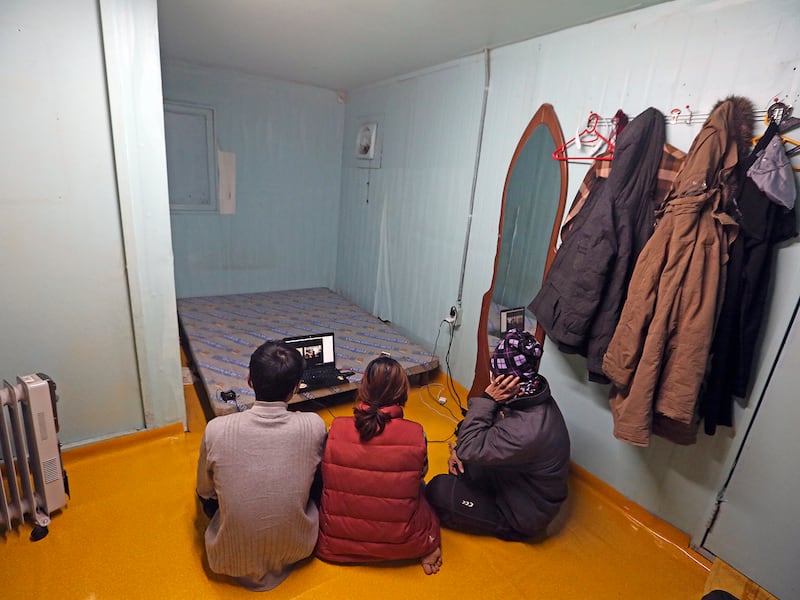A Cambodian migrant worker in South Korea said on Friday that his passport was recently revoked after he used Facebook to criticize the Cambodian government.
Buth Vichai told Radio Free Asia that he learned of the passport cancellation from a Phnom Penh government official. His current passport will expire in July, he said.
“I am happy to be an illegal immigrant in another country, and I will not bow my head to respect or apologize to this scoundrel regime,” he said.
It was unclear which of Buth Vichai’s online comments led to the cancellation. RFA couldn’t immediately reach Foreign Ministry spokesman Chum Sounry, government spokesman Pen Bona and deputy Interior Ministry spokesman Touch Sokha for comment on Friday.
Buth Vichai said the move was an attempt to intimidate him and other Cambodian activists who live outside the country.
In August, overseas Cambodians living in South Korea, Japan, France, Canada and Australia held protests against Cambodia’s economic cooperation agreement with Vietnam and Laos. The demonstrations angered Senate President Hun Sen and led to a widespread crackdown.
Article 33 of the Cambodian Constitution states that Cambodian citizens cannot be deprived of their citizenship or deported to any foreign country except by mutual agreement.

Governments in countries that follow the rule of law can be expected to respect and protect the rights of individuals, said Soeng Senkaruna of the Cambodian Democracy Organization in Australia.
“Indeed, governments in liberal countries are very careful in all their actions regarding any issue,” he said. “If it is just criticism of the government. I understand that liberal countries, especially South Korea, do not arrest them just for passport issues.”
There are about 54,000 Cambodian workers in South Korea employed in construction, agriculture and other industries who annually send home an estimated US$300 million, according to the Center for Alliance of Labor and Human Rights.
Last year, Cambodian officials canceled the passport of Nuon Toeun, a Cambodian domestic worker in Malaysia who posted critical comments about Hun Sen on Facebook. She was soon deported to Cambodia and charged with incitement.
Draft law on Khmer Rouge comments
Meanwhile, Cambodia’s Cabinet has approved a draft law that would allow for the prosecution of individuals who minimize or deny the existence of crimes committed during the period when the Khmer Rouge ruled Cambodia.
The crime would carry a punishment of between one and five years in prison and would allow for fines from 10 million riel (US$2,480) to 50 million riel (US$12,420).
The Khmer Rouge regime was responsible for the deaths of more than 1 million people from starvation, overwork or mass executions between 1975 and 1979.
“The law aims to record the history so that people will remember the painful history that happened in Cambodia,” the Council of Ministers said in a statement on Friday.

The draft law now goes to the National Assembly for review and approval.
It was unclear what prompted the measure, which was initiated by Hun Sen in May 2024.
That was the same month that Hun Sen called for an inquiry into disparaging social media comments about him that were posted on TikTok and Facebook in Vietnamese.
Some of the comments read: “Vietnam sacrificed its blood for peace in Cambodia,” and “Don’t forget tens of thousands of Vietnamese volunteers who were killed in Cambodia.”
Hun Sen was a Khmer Rouge commander who fled to Vietnam in 1977 amid internal purges. He later rose to power in a government installed by Vietnam after its forces invaded in late 1978 and quickly ousted the Khmer Rouge regime.
RELATED STORIES
Cambodia’s Funan Techo canal exposes cracks in Vietnam ties
Cambodia publicly shames maid deported after criticizing Hun Sen
Cambodia’s embassy in South Korea extends passport services for 60 days
Suspected Vietnamese netizens target Cambodia’s Hun Sen on TikTok
Vietnamese forces remained in Cambodia for the next decade battling Khmer Rouge guerrillas based in sanctuaries on the Thai border.
Hun Sen said in May that he suspected the reason for the critical comments was probably the Funan Techo canal project, which was proposed and approved when he was prime minister.
The project has raised concerns in Vietnam as its Mekong River delta, home to 17.4 million people, is downstream and could be severely affected.
Translated by Yun Samean. Edited by Matt Reed.
